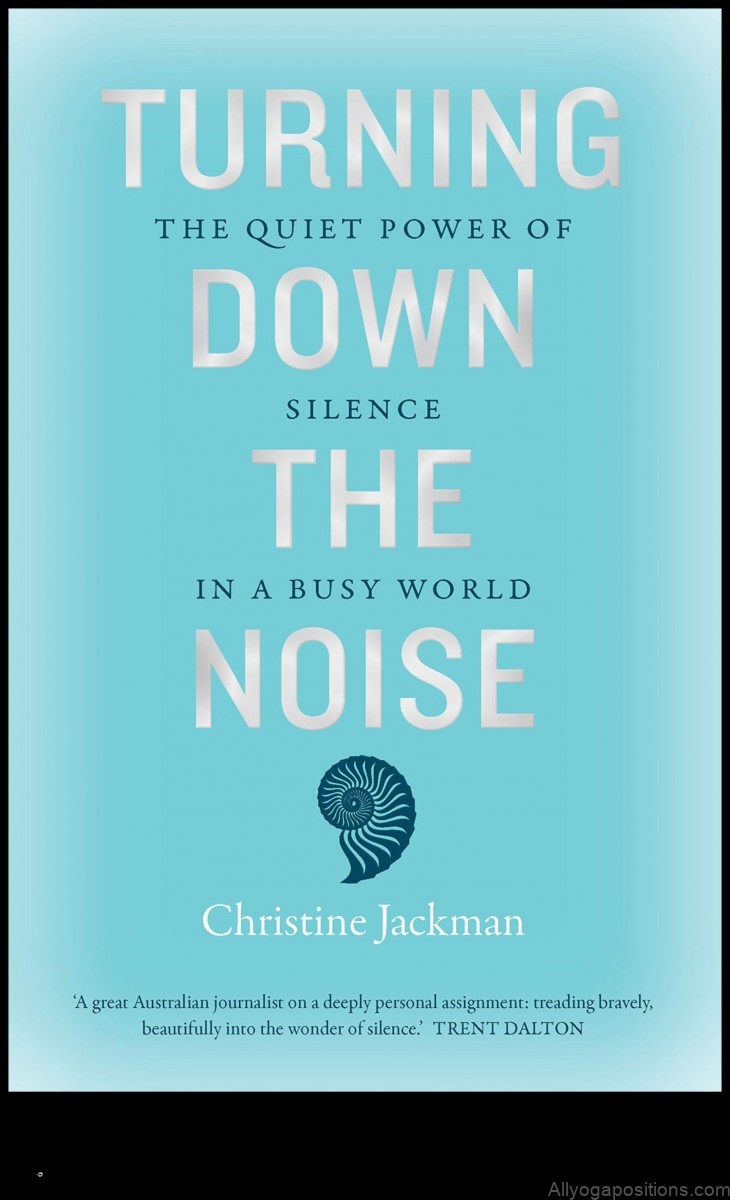
Silencing the Noise: The Power of Meditation in a Busy World
Meditation is a practice that has been around for centuries, and it is now being increasingly recognized for its many benefits. Meditation can help to reduce stress, anxiety, and depression, and it can also improve focus, concentration, and creativity. In this article, we will explore the power of meditation and how it can help you to live a more balanced and fulfilling life.

Benefits of Meditation
There are many benefits of meditation, including:
- Reduced stress and anxiety
- Improved focus and concentration
- Increased creativity
- Improved sleep
- Reduced pain
- Enhanced immunity
- Improved overall well-being
How to Meditate
Meditation is a simple practice that anyone can learn. There are many different ways to meditate, but the basic steps are the same. Here are the steps to get started:
- Find a quiet place where you will not be disturbed.
- Sit in a comfortable position with your back straight.
- Close your eyes and focus on your breath.
- Breathe in slowly and deeply through your nose.
- As you breathe out, let go of any tension or stress in your body.
- Continue to breathe in and out slowly and deeply for a few minutes.
- When you are finished, open your eyes and slowly come back to your surroundings.
It is important to practice meditation regularly in order to see the benefits. Start by meditating for a few minutes each day and gradually increase the length of your meditation sessions as you feel comfortable.

Different Types of Meditation
There are many different types of meditation, each with its own unique benefits. Some of the most popular types of meditation include:
- Mindfulness meditation
- Transcendental meditation
- Vipassana meditation
- Zen meditation
- Kundalini yoga meditation
You can experiment with different types of meditation to find one that works best for you. There is no right or wrong way to meditate, so find a practice that you enjoy and that helps you to relax and connect with your inner self.
Common Myths about Meditation
There are many myths about meditation that can prevent people from trying it. Some of the most common myths include:
- You have to be good at meditation to do it.
- Meditation is only for religious people.
- Meditation is boring.
- You can’t meditate if you have a busy mind.
None of these myths are true. Meditation is a simple practice that anyone can learn, regardless of their age, religion, or level of experience. Meditation is not boring, and it can actually be very enjoyable. And while it is true that some people have a more difficult time meditating than others, it is possible for everyone to learn how to meditate.
Where to Meditate
You can meditate anywhere, but there are some places that are better suited for meditation than others. Some of the best places to meditate include:
- A quiet room at home
- A park or other natural setting
- A yoga studio or meditation center
- A library or other quiet public place
The most important thing is to find a place where you will be comfortable and undisturbed.
How Often to Meditate
There is no right or wrong answer to the question of how often to meditate. The best frequency for you will depend on your individual needs and preferences. However, most experts recommend meditating for at
| Topic | Feature |
|---|---|
| Meditation | A mental practice that involves training attention and awareness |
| Mindfulness | A state of awareness that allows you to pay attention to the present moment |
| Stress | A state of mental or emotional strain or tension |
| Anxiety | A feeling of worry, nervousness, or unease |
| Relaxation | A state of physical or mental ease |
II. Benefits of meditation
Meditation has been shown to have a number of benefits for both physical and mental health. These benefits include:
- Reduced stress and anxiety
- Improved focus and concentration
- Increased happiness and well-being
- Improved sleep
- Reduced pain
- Enhanced immune function
- Lowered blood pressure
- Reduced risk of heart disease and stroke
How to meditate
Meditation is a practice that has been around for centuries. It is a way to quiet the mind and focus on the present moment. There are many different ways to meditate, but all of them involve some form of relaxation and focus.
When you meditate, you are essentially training your mind to be more present and aware. This can help you to reduce stress, anxiety, and improve your focus. It can also help you to sleep better, have more energy, and be more creative.
If you are new to meditation, it is important to start slowly and gradually increase the amount of time you meditate each day. You may also want to find a meditation teacher or group to help you get started.
Here are some tips for how to meditate:
- Find a quiet place where you will not be disturbed.
- Sit in a comfortable position, either on a chair or on the floor.
- Close your eyes and relax your body.
- Focus on your breath.
- Let your thoughts come and go without judgment.
- When you are finished meditating, open your eyes and slowly stand up.
Meditation is a practice that takes time and dedication to master. However, the benefits of meditation are well worth the effort. If you are looking for a way to reduce stress, anxiety, and improve your overall well-being, meditation is a great option.
IV. Different types of meditation
There are many different types of meditation, each with its own unique benefits. Some of the most popular types of meditation include:
- Mindfulness meditation
- Transcendental meditation
- Vipassana meditation
- Zen meditation
- Kundalini yoga
Each type of meditation has its own set of instructions and techniques. It is important to find a type of meditation that you enjoy and that fits your individual needs.
V. Common myths about meditation
There are many myths about meditation that can prevent people from trying it. Here are some of the most common myths, and the truth behind them:
-
Myth: Meditation is only for religious people.
Truth: Meditation is not a religious practice. It is a secular practice that can be used by people of all faiths and beliefs.
-
Myth: Meditation is difficult to learn.
Truth: Meditation is actually very easy to learn. It doesn’t require any special skills or abilities.
-
Myth: Meditation makes you sleepy.
Truth: Meditation can actually help you to feel more alert and focused.
-
Myth: Meditation is a waste of time.
Truth: Meditation has been shown to have many benefits for both physical and mental health.
If you’re interested in learning more about meditation, there are many resources available online and in libraries. You can also find classes and workshops in your local community.
VI. Where to meditate
You can meditate anywhere, but there are some places that are more conducive to meditation than others. Here are a few tips for choosing a good place to meditate:
- Find a place that is quiet and peaceful.
- Make sure you are comfortable and won’t be disturbed.
- If you can, find a place where you can see nature.
- If you are new to meditation, you may want to start by meditating in a place where you won’t be interrupted.
Some common places to meditate include:
- Your home
- A park
- A library
- A yoga studio
- A meditation center
Ultimately, the best place to meditate is the place where you feel most comfortable and at peace.
VII. How often to meditate
There is no one-size-fits-all answer to the question of how often to meditate. The ideal frequency will vary depending on your individual needs and goals. However, most experts agree that meditating for at least 20 minutes per day, 3-4 times per week, is a good place to start.
If you are new to meditation, it is important to start slowly and gradually increase the amount of time you meditate each day. You may find that it is helpful to meditate for shorter periods of time, but more frequently throughout the day. For example, you could meditate for 5 minutes in the morning, 5 minutes at lunchtime, and 5 minutes before bed.
As you become more experienced with meditation, you may find that you are able to meditate for longer periods of time. However, it is important to listen to your body and mind and not to push yourself beyond your limits. If you find that you are feeling tired or overwhelmed, it is better to take a break from meditation and come back to it later.
The most important thing is to find a meditation practice that works for you and that you can stick to. If you are consistent with your practice, you will eventually start to see the benefits of meditation in your life.
How long to meditate
VIII. How long to meditate
The length of time you meditate each day is up to you and what works best for your schedule and lifestyle. Some people find that it is helpful to start with shorter meditations of 5-10 minutes and gradually increase the length of time as they become more comfortable with the practice. Others prefer to meditate for longer periods of time, such as 20-30 minutes or more. There is no right or wrong answer, so experiment with different lengths of time to see what feels best for you.
It is important to note that the length of time you meditate is not as important as the quality of your meditation practice. It is more beneficial to meditate for a shorter period of time and be fully present and engaged in the practice than to meditate for a longer period of time and be distracted or unfocused.
If you are new to meditation, it may be helpful to start with shorter meditations and gradually increase the length of time as you become more comfortable with the practice. Here are some tips for beginners:
- Set a timer for your meditation session. This will help you to stay focused and avoid getting distracted.
- Find a comfortable position to sit in. You can sit in a chair, on the floor, or even in bed. Just make sure that you are comfortable and that your spine is straight.
- Close your eyes and focus on your breath. Notice the feeling of the air as it flows in and out of your lungs.
- If your mind wanders, gently bring your attention back to your breath.
- Continue to meditate for the length of time that you set for yourself.
As you become more comfortable with meditation, you may find that you are able to meditate for longer periods of time. However, it is important to listen to your body and not to push yourself beyond your limits. If you start to feel uncomfortable or restless, it is okay to end your meditation session early.
Meditation is a lifelong practice, and the benefits will continue to grow as you continue to practice. The more you meditate, the easier it will become to quiet your mind and focus on the present moment.
Tips for beginners
Meditation can be a great way to reduce stress, improve focus, and find peace of mind. However, it can be difficult to know where to start if you’re a beginner. Here are a few tips to help you get started:
- Find a quiet place where you won’t be disturbed.
- Sit in a comfortable position, either cross-legged on the floor or in a chair with your feet flat on the ground.
- Close your eyes and focus on your breath.
- As thoughts come into your mind, let them go without judgment.
- Continue to focus on your breath for as long as you like.
Meditation is a practice, and it takes time to develop the skills necessary to do it well. Don’t be discouraged if you find it difficult at first. Just keep practicing, and you’ll eventually get better at it.
FAQ
Q: What is meditation?
A: Meditation is a practice where an individual uses a technique – such as mindfulness, breathing exercises, or yoga – to train attention and awareness.
Q: What are the benefits of meditation?
A: Meditation has been shown to have many benefits for both physical and mental health, including reducing stress, anxiety, and depression; improving sleep; boosting mood; and increasing focus and clarity.
Q: How do I start meditating?
A: There are many different ways to meditate, and the best way to start is to find a technique that feels right for you. Some popular methods include mindfulness meditation, breathwork meditation, and yoga. There are many resources available to help you get started, such as books, online tutorials, and apps.
Table of Contents
Maybe You Like Them Too
- Yoga for Respiratory Health 5 Poses to Help You Breathe Easier
- Yoga for Emotional Healing Find Bliss in Your Body and Mind
- Yoga for Emotional Resilience 5 Poses to Help You Stay Calm and Centered
- Yoga for Emotional Release A Gentle Practice to Help You Move Through Grief
- Meditation and Emotional Intelligence A Mindful Guide to Navigating Your Feelings
